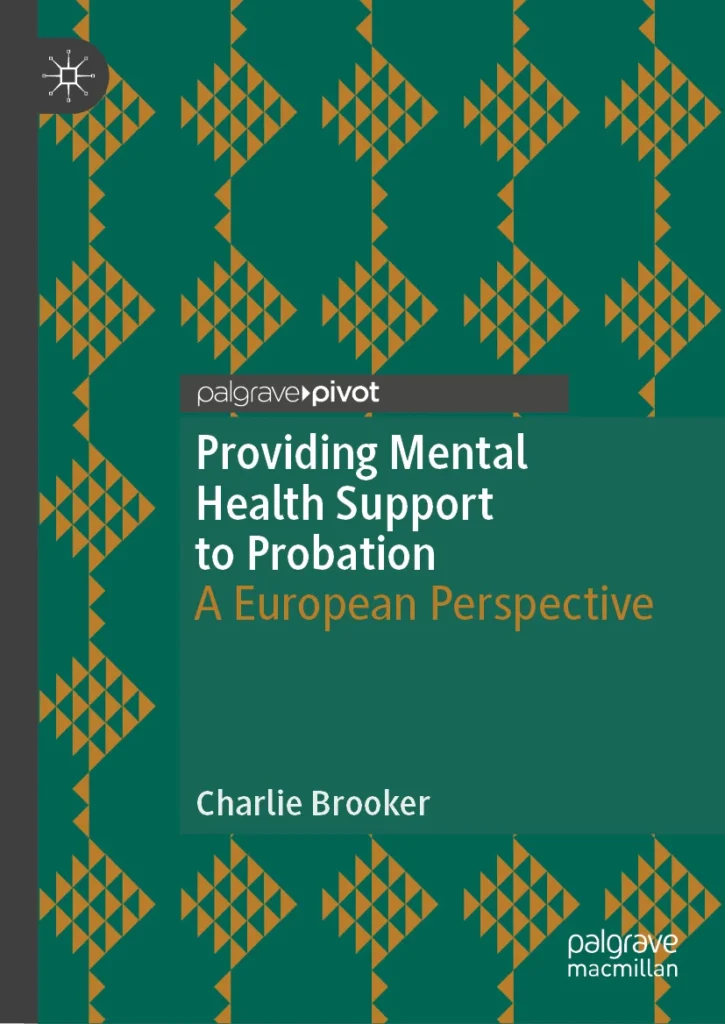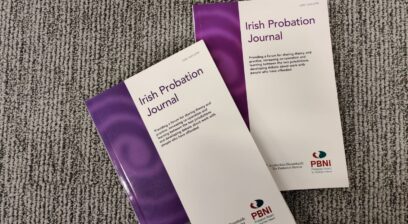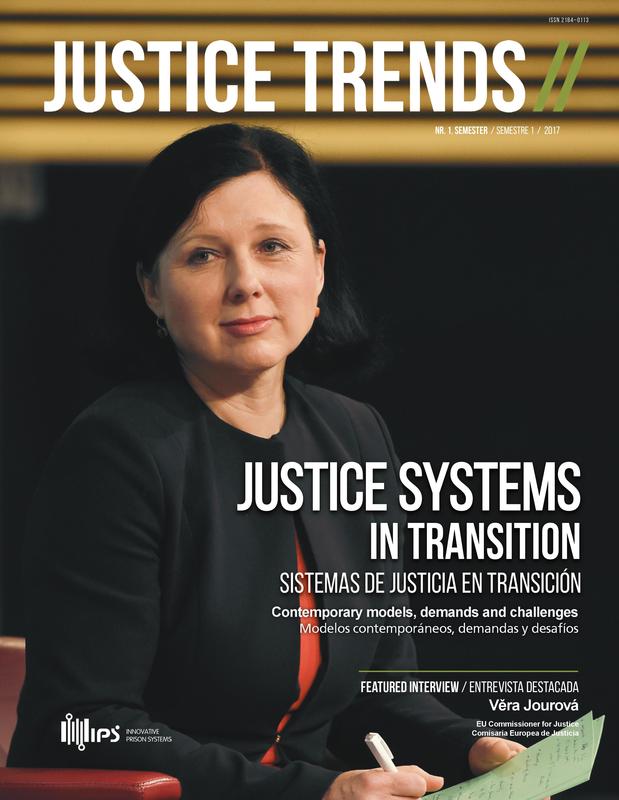‘Providing Mental Health Support to Probation – A European Perspective’ by Charlie Brooker is now available. This book offers an evidence-based exploration of mental health in probation, drawing on research across 27 European countries to provide valuable insights on support mechanisms for individuals on probation.
Probation library
Women in the Criminal Justice System: Supporting Pathways Away from Offending
Women in the Criminal Justice System: Supporting Pathways Away from Offending. An interview with Probation Officer, Caitriona Dennan, by the Probation Service

As a bright teenager growing up in Pearse Street in Dublin’s inner city, Caitriona Dennan was drawn to social work and the idea of working with people with a criminal justice history. A meeting with the former governor of Mountjoy prison, John Lonergan, arranged by her English teacher when she was still in school, left a big impression on her. When she met with him in Mountjoy, Governor Lonergan brought her over to the Dachas’ Centre – the female prison – where she sat and chatted with some of the women in custody. It was the first time she had ever been inside a prison.
Caitriona laughs out loud when she thinks back to that day, “I remember sitting in the canteen having a cup of tea with the Governor and thinking about the fact that I had a good bit of cash in my bag because I was going to pay for a holiday that afternoon, and being terrified of sitting there with all that money in my bag!”
Caitriona went on to study Social Science in Liverpool, worked for several years at Oberstown Children Detention Campus and then landed a job as a Probation Officer with the Probation Service.
Six years ago, Caitriona returned to the Dóchas Centre, this time to join the Probation Service team based there. The Probation Service team in Dóchas work with women serving short, medium and long-term sentences. As well as writing court reports and assessments, there is a strong focus on preparing the women for reintegration back into the community, post release.
Caitriona often thinks back to the day when she drank tea in the canteen and her perception of the women in the Centre compared to what she now knows to be true. In her experience a typical client in Dóchas had been a heavy drug or alcohol user, sometimes homeless and often the victim of domestic abuse. They appear thin, frail and vulnerable, “I have rarely felt intimidated by any woman I have met in the prison. That’s probably very different from the public’s perception of a female person who offends, I think they imagine them to be tough, dangerous, manipulative”.
It is widely acknowledged that women’s pathways into offending differ from those of men. In keeping with worldwide trends, women in Ireland tend to serve prison sentences for lower-level, non-violent offences. According to latest statistics, 45% of those in prison are sentenced for theft and related offences1.
One of the biggest challenges facing any Probation Officer is connecting with their clients and building a strong working relationship with them. Caitriona explains how she goes about doing that; “You just have to work with the women where they’re at. I always say to them when they come into me – don’t feel any shame when you’re in here, I’m not here to judge you, you have been judged. But let’s see what we can change”.
While her focus is supporting the women she works with, she is very aware that they are in custody for causing harm,“I fully understand that there are victims out there who have been traumatised by what has happened to them, and some of the women responsible for that are in Dóchas. A core part of our work with these women is focussing on the offence, discussing the harm that has been caused”.
Caitriona appreciates that the public, particularly those who have been victims of crime, will question whether the women she works with can change, but she says, “I genuinely believe that 95% of women in prison want to change, I do believe that desire is there. The thing is, they really need their tangible supports when they leave prison, they are so vulnerable”.
Supported accommodation, part-funded by the Probation Service, like the Outlook programme and Tús Nua in Dublin provide resettlement support to women leaving prison. Caitriona works hard to place her clients there if she feels they are a good fit,
“Sometimes it’s clear to me that they’re not ready or able to make a change, and you do see them coming back in the door months later. But when it works, its great and those women do get their lives back on track and don’t reoffend”.
Many women in Dóchas have lost their children, often due to neglect and as a consequence of their own drug or alcohol use. Caitriona believes that women, much more so than men, carry the guilt of that with them and are haunted by it. “When they talk about their kids, you can see their heads dropping. They do want them to visit but they don’t want the kids to see them in custody and years can go by without contact. They can forget though that a lot of damage has been done”.
Caitriona explains that women who have received a prison sentence simply don’t have the same support networks in the community as men. From her vantage point in Dóchas Caitriona often watched the footfall on visiting day at the men’s prison. All day she would see a constant stream of visitors, the wives, partners, mothers and families arriving to see their loved ones inside. But visiting day in Dóchas is a much quieter affair, “The women do get visits, but for the most vulnerable, it’s usually only from their solicitors, or social care workers”.
Last month, Caitriona passed through the gates at Dóchas for the last time as a part of the Probation team at the prison; she has just taken up a new position as a probation officer in the community and is enjoying the new job. But she carries the memory of the Dóchas women with her and she knows she will continue to watch out for them, “When I hear of a homeless woman who has died, I want to find out who it is, to know if I know her or if have worked with her. You never forget them”.

Probation library
Lorem ipsum dolor sit amet consectetur adipiscing elit semper dalar elementum tempus hac tellus libero accumsan.

Technology
Is AI Putting Remote Probation Supervision at Risk Before It Even Starts?
09/04/2025
David Jackson and Jed Stone focus on the use of AI in probation and advocate for investigations to understand the opportunity, address issues and innovate for the good of all.

Probation in Europe
New Executive summaries for the report on Building Probation Capacity
19/02/2025
In March 2024, we paid attention to the study of Steve Pitts and Leo Tigges about Building Probation Capacity . The executive summary of their publication is now available in French and German, including the infographic on capacity building in both languages. Later this year, translations in Italian and Spanish will also be released!

Probation in Europe
A day in a life of a Probation Officer
10/12/2024
Is the day of a probation officer in Germany similar to the one of someone working in Romania? In the series ‘A day in the life of a probation officer’, we publish articles written by probation officers from different countries in Europe to see if their days look a like or are very different from each other.

Mental Health
Providing Mental Health Support to Probation – A European Perspective
10/12/2024

Probation in Europe
EuroVista
10/12/2024
The publication of EuroVista journals stopped in 2016. On this page you can find the online journals volume 1.1 – 4.2. If you would like to have your research published on the CEP website, please send an email to communication@cep-probation.org.
EuroVista was published up to three times a year by CEP, the Confederation of European Probation. The journal is dedicated to linking research with policy and practice in probation and community justice throughout Europe. EuroVista seeks to share experience of good practice and responses to challenges that may have relevance to many countries across the continent.
EuroVista aims to publish articles that are relevant and accessible to practitioners, managers and policy makers in a wide range of criminal and community justice agencies, especially probation. It is also read by students, researchers, scholars of criminal justice and others who are interested in the subject matter. Whole issues or individual contributions can be downloaded without charge.

Electronic monitoring
Journal of Offender Monitoring
10/12/2024
Journal on monitoring technology and its use in enhancing public safety. More information on the website of the Civic Research Institute.

Criminal Justice
The girl who kept her eyes open
10/12/2024
Most of the Ukrainian victims of war who take refuge in EU countries are women and children. And these children go to school in their host community, with it becoming one of the first points of contact between the local population and the refugees.
The book ‘The Girl Who Kept Her Eyes Open’ aims to raise awareness among children (7-10 years old) and adults (parents and teachers) of the problems suffered by people fleeing war and their rights.
Through the story of a Ukrainian refugee child meeting a particularly observant little girl in her new school, it shows the importance of paying attention to others in order to recognize the victims of crime – in this case, the victims of war-related crimes – and offer them support.

Uncategorized
Irish Probation Journal
10/12/2024
The Irish Probation Journal aims to provide a forum for sharing theory and practice, increasing co-operation and learning and developing debate about work with offenders. The journal is supported by the Probation Board for Northern Ireland (PBNI) and the Irish Probation Service.

Uncategorized
Justice Trends Magazine
10/12/2024
JUSTICE TRENDS is a premium printed and online magazine that features exclusive content such as interviews with Ministers of Justice, Directors General of prison and probation administrations, as well as articles on pressing current criminal justice topics globally.

Education & Training
I, Who had it Figured Out!
10/12/2024
“I, who had it figured out!” is a memoir by Patrick O’Dea, a social worker who has worked in the Probation Service for twenty years, followed by 17 years in the Social Work School of Trinity College Dublin. Now, he works part-time at University College Dublin. The book reflects on O’Dea’s 40-year journey in social work, including his time as a teacher at Trinity College, Dublin. It explores his experiences in 1970s Ireland, his commitment to the ideals of social work, and the impact of his profession on real lives. The memoir has received endorsements for its wisdom and insight from notable figures in the field of social work.
Subscribe to our bi-monthly email newsletter!
"*" indicates required fields
- Keep up to date with important probation developments and insights.

